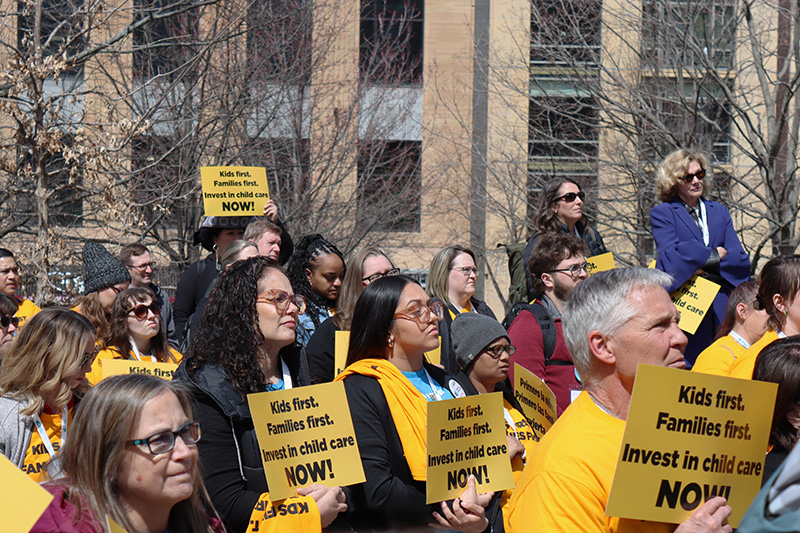
Children, families, employers and other community stakeholders who rely on Wisconsin’s early childhood education sector celebrated a big step forward this summer when Gov. Tony Evers signed the 2025-27 biennial state budget with over $330 million included to support child care.
Advocates organized by Milwaukee Succeeds, the Greater Milwaukee Foundation’s education initiative, were among the strongest voices calling for this public investment in early childhood educators, providers and family resources. Milwaukee Succeeds coordinates an Early Childhood Education ambassador program as part of its leadership role in the MKE Early Childhood Education Coalition.
“Educators show up. They give their all. It’s past time our centers are funded in a way that they don’t have to fear closing their doors,” Callie Colbo, an ECE ambassador, said. “This budget win told educators: ‘We see you. You matter. Your voice counts.’ But there’s still work to do. Funding shouldn’t be a temporary fight – it should be permanent.”
Colbo, who has been an ECE ambassador for the past two years, called and emailed her state representatives, shared advocacy resources with other moms and caregivers, and helped coordinate and implement many advocacy efforts including virtual advocacy trainings.
“We made ourselves impossible to ignore, and that was the goal—because when we come together, they can’t un-see us, even if they try,” she said.
This investment in child care includes the following:
- $110 million in direct payments to child care providers, which will help keep doors open, reduce waiting lists and decrease costs for families
- $65 million toward the Department of Children and Families’ school readiness program
- $123 million in additional support for Wisconsin Shares, a subsidy program that helps families afford child care costs
“This state budget reflects the growing understanding that child care is inextricably linked to the educational, social and economic health of Wisconsin,” Greg Wesley, the Foundation’s president and CEO, said. “We must ensure that the investments don’t stop here but continue to grow until Wisconsin is a model for early childhood education in the country.”
Since the Foundation’s goal is the long-term health and sustainability of the sector – including access and affordability for families – its ongoing work to convene partners and secure external funding will continue alongside its considerable institutional support of early childhood education through strategic grantmaking, donor co-investment and impact investing.
Systems change work continues with new department
Advocating for supportive public policy in the early childhood education and other sectors is one of the ways the Foundation helps advance lasting solutions to structural inequities through systems change.
“There was recognition that GMF as a community foundation was already naturally doing much of the work related to influencing systems in the public sector from commissioning research to making investments in grassroots organizations to convening community and working on a shared vision of change,” Dave Celata said.
He continued, “what we were missing was just that little bit of additional capacity to strengthen internal alignment around our strategic priorities as an organization and to be able to then catalyze that alignment to drive forward better systems for the people of greater Milwaukee.”
With that in mind, the Foundation created a new Policy and Research Department this year with Celata at the helm as vice president. He previously served as deputy director for Milwaukee Succeeds and the managing director for the Wisconsin Partnership.
While the Foundation is not the first community foundation to create a policy and research department, it is among the first wave of them to do so including the Denver Foundation and the Pittsburgh Foundation.
“The opportunity to drive transformative impact is incredibly motivating,” Celata said. “The Foundation already does so much good and it is capable of doing even more, but the Foundation and its investments alone are not going to create a Milwaukee that’s truly for all…we need to be thinking about not only how we partner with other philanthropic organizations, with community members, with civic organizations; but then how we’re working with local and state government to drive forward that vision.”
Looking ahead
In addition to Celata, the Policy and Research Department consists of Ian Bautista, senior director of civic engagement, and Brandis Hill, civic engagement specialist. An additional position is being created to lead state coalition building in partnership with Milwaukee Succeeds and other place-based partnerships across Wisconsin. For the near future, the department’s focus remains on early childhood education and reading.
Long-term focus areas will be determined by the Foundation’s next strategic plan, which is under development. The evidenced-based policy agenda will be tied to the Foundation’s named priorities to ensure intentionality and a strategic focus. And the Foundation will continue to engage donors and partners interested in joining opportunities for greater philanthropic and community impact.